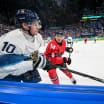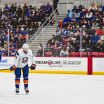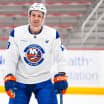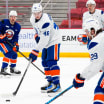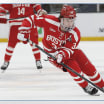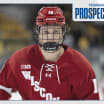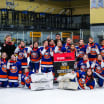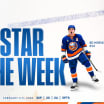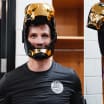Two panels of powerful women in hockey and sports business shared their stories on Monday at UBS Arena for Women in Sports Event, presented by Northwell Health, exemplifying both the contribution as well as the bright future of women in hockey.
Opening remarks were given by Dr. Stacey Rosen, SVP of Katz Institute for Women's Health and a practicing Cardiologist at Northwell Health. Dr. Rosen began by explaining how the history of medical developments only focused on studying men, but has evolved to include and focus on women.
The Islanders Celebrate Women in Sports with Annual Panel
The New York Islanders hosted their third annual Women in Sports Event presented by Northwell Health
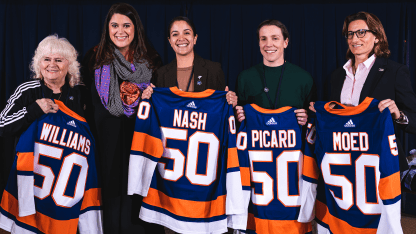
By
Rachel Luscher
NewYorkIslanders.com
"We know that women historically didn't kind of get all the breaks when it came to medical research and healthcare," Rosen said. "The Cancer Institute has really launched a revolution to change the way we see healthcare. When women are healthier, their families are healthier and communities are healthier. We study what's different in women, we empower them to ask the right questions, really organizing our institute around women."
"We also want to promote and advance female leaders, which is a real priority at Northwell," Rosen added.
The event opened with a panel focused on women with playing, coaching and leadership experience, moderated by MSG Reporter and Host Shannon Hogan.
Three of the panelists were connected to the Premier Hockey Federation, formerly known as the NWHL. Alexis Moed, General Manager the Connecticut Whale, spoke alongside Kelly Nash, LIU Sharks women's ice hockey head coach, and Olympian Michelle Picard. Picard played for the Metropolitan Riveters, while Nash was an Associate Coach.
"The attitude towards women playing hockey is much different than when we were younger," said Moed. "And I don't think the girls feel that they're now playing a boy sport. They're playing their sport."
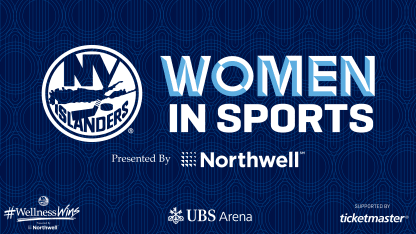
Despite the various different background stories of the panelists, they all have one thing in common.
"I played exclusively with boys all the way up through prep school hockey," Moed said. "There weren't many girls in hockey, there wasn't much opportunity."
When they were growing up, there wasn't a set path, or dedicated league, for women to pursue professional hockey as a career. The path to making headway as a female hockey player wasn't easy either.
"In order to find competitive girls hockey at the travel level, I actually had to go off and play in Connecticut," Moed explained, who grew up on Long Island. "So, I would commute from the island to Connecticut to play."
She used her passion to give back and pave the way for the next generation of female athletes. Moed founded the Islanders Girls Elite Hockey team and is seeing success in its seventh year, giving girls the opportunity to play ice hockey.
"We are starting to see more opportunity in areas that had not previously had a lot of girls hockey," Moed said. "I credit that to not just the growth of the professional league, but the feeder to that, which is really the collegiate level.
"The doors have opened for all women in football, basketball, baseball, and hockey as well," said Barbara Williams, the NHL's first female skating coach. "I am so happy to see that. It took me a long time to see that."
For Williams, the possibility of becoming a skating coach was unimaginable, until it happened.
As a director of a skating school in Farmingdale in the 1970s, Williams brought in a wealth of experience as a champion figure skater and speed skater. She shared a rink with the New York Islanders, where she once had an encounter with Bobby Nystrom that changed the trajectory of her career.
Williams noticed him practicing his skating one day. Nystrom asked to train with her and they quickly became on-ice companions.
Williams picked up more and more "students," coaching the players of the dynasty on their skating techniques, sharpening their skills. One thing led to another, she picked up more and more students until she was announced as the first female skating coach.
"During those times and at that age - I never thought any team would ever do that - that I would train a men's team on a national level," Williams said. "I never thought that would happen, ever."
To complement the panel, Monday's game experience featured elements to highlight and empower women in sports, including an art exhibit to strengthen the message with visuals.
Kim Sass, a former NWHL player, displayed her art gallery, "Behind the Front" for guests to view in the concourse at UBS Arena. Her artwork illustrated female hockey players to generate conversations about what it will take to achieve true equality in the sport.
Along with growth and opportunity for women on the ice, equality is progressing off the ice as well.
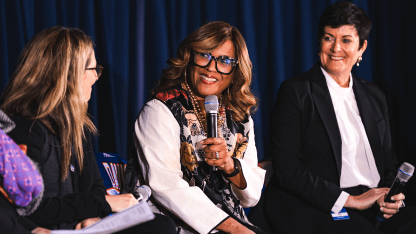
Many college students were in attendance to learn from the best in the field of sports business, while receiving the opportunity to take a professional headshot at Monday's event. Debbie Patire, a marketing and business development executive at Coca-Cola, shared advice for women entering the business side of sports.
"Follow your passion points and learn everything," Patire said. "Don't be afraid to ask questions. Don't be afraid to sometimes do things with calculated risks."
"I think if you center yourself around your purpose, then you will be successful," said Kim Davis, NHL Senior EVP/Social Impact, Growth Initiatives and Legislative Affairs. "That takes a lot of courage."
Davis discussed and shared her mantra of the three P's: preparation, passion and purpose. Through her upbringing she had a particularly inspiring role model.
"My grandmother used to say that being fearless doesn't mean you aren't scared. It just means that despite being scared, we persevere," Davis said. "And she was the first Black woman to graduate from Harvard in 1939, so I think she knew something a little bit about that."
Kim Stone, President of UBS Arena, sent the message to take opportunities even without feeling fully ready, because the most important part of any career is the learning process.
"It's that confidence that you can," Stone said.
Jessica Berman was another panelist with a loaded resume in sports business. Berman serves as the Commissioner of the National Women's Soccer League and held leadership positions in the National Lacrosse League and NHL. Her desire to work in sports was sparked by attending an Islanders game at age 16, witnessing a moment of unity at Nassau Coliseum.
Thanks Jon Ledecky and all @NYIslanders for including me in their women's #sportsbiz discussion last night @UBSArena. Great thoughts by some of the smartest industry leaders, & got to spend time with one of my mentors, the amazing @kbdavis7760 Kim Davis #Isles #nhl pic.twitter.com/ypMyuXh2Yc
— Jessica Berman (@JessicaBerman1) March 28, 2023
"I saw two people embrace following a goal who were clearly from different backgrounds," Berman said. "I asked them in that moment, whether they had ever met before, and they said they hadn't. They were just sharing their love of the Islanders."
The panelists channeled their passion for unity into inspiring the next generation of women in sports, both in the realm of athletics and business executives. Because of the women who paved the way in this industry, the opportunities for the next generation is on an upward trajectory.
"I hope that we continue in this direction and there are more people willing to support women's sports," Picard said. "It's an indescribable feeling to feel welcome and be a part of this growing community."

